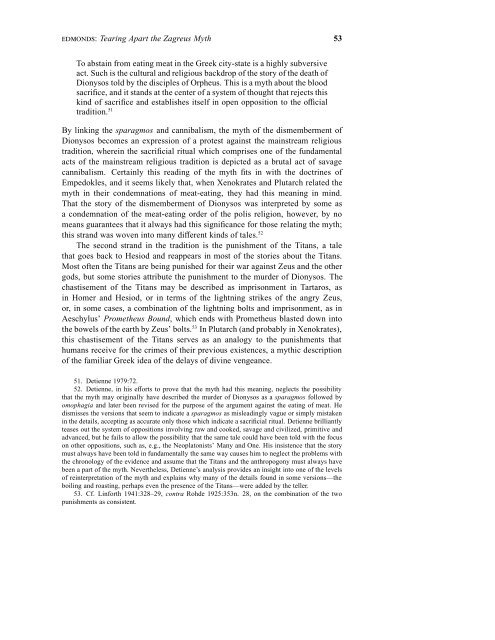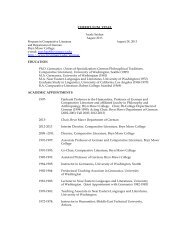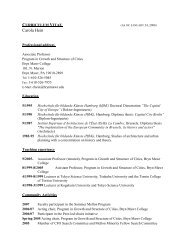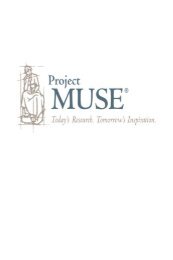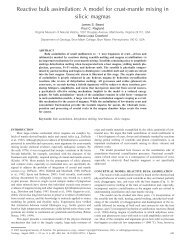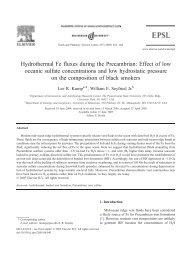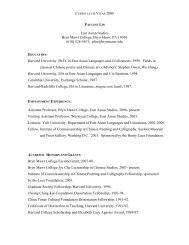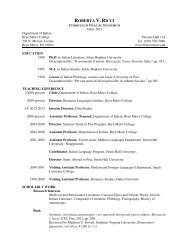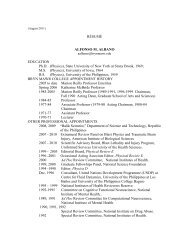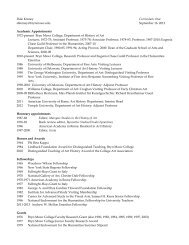Tearing Apart the Zagreus Myth - Bryn Mawr College
Tearing Apart the Zagreus Myth - Bryn Mawr College
Tearing Apart the Zagreus Myth - Bryn Mawr College
You also want an ePaper? Increase the reach of your titles
YUMPU automatically turns print PDFs into web optimized ePapers that Google loves.
EDMONDS: <strong>Tearing</strong> <strong>Apart</strong> <strong>the</strong> <strong>Zagreus</strong> <strong>Myth</strong> 53<br />
To abstain from eating meat in <strong>the</strong> Greek city-state is a highly subversive<br />
act. Such is <strong>the</strong> cultural and religious backdrop of <strong>the</strong> story of <strong>the</strong> death of<br />
Dionysos told by <strong>the</strong> disciples of Orpheus. This is a myth about <strong>the</strong> blood<br />
sacrifice, and it stands at <strong>the</strong> center of a system of thought that rejects this<br />
kind of sacrifice and establishes itself in open opposition to <strong>the</strong> official<br />
tradition. 51<br />
By linking <strong>the</strong> sparagmos and cannibalism, <strong>the</strong> myth of <strong>the</strong> dismemberment of<br />
Dionysos becomes an expression of a protest against <strong>the</strong> mainstream religious<br />
tradition, wherein <strong>the</strong> sacrificial ritual which comprises one of <strong>the</strong> fundamental<br />
acts of <strong>the</strong> mainstream religious tradition is depicted as a brutal act of savage<br />
cannibalism. Certainly this reading of <strong>the</strong> myth fits in with <strong>the</strong> doctrines of<br />
Empedokles, and it seems likely that, when Xenokrates and Plutarch related <strong>the</strong><br />
myth in <strong>the</strong>ir condemnations of meat-eating, <strong>the</strong>y had this meaning in mind.<br />
That <strong>the</strong> story of <strong>the</strong> dismemberment of Dionysos was interpreted by some as<br />
a condemnation of <strong>the</strong> meat-eating order of <strong>the</strong> polis religion, however, by no<br />
means guarantees that it always had this significance for those relating <strong>the</strong> myth;<br />
this strand was woven into many different kinds of tales. 52<br />
The second strand in <strong>the</strong> tradition is <strong>the</strong> punishment of <strong>the</strong> Titans, a tale<br />
that goes back to Hesiod and reappears in most of <strong>the</strong> stories about <strong>the</strong> Titans.<br />
Most often <strong>the</strong> Titans are being punished for <strong>the</strong>ir war against Zeus and <strong>the</strong> o<strong>the</strong>r<br />
gods, but some stories attribute <strong>the</strong> punishment to <strong>the</strong> murder of Dionysos. The<br />
chastisement of <strong>the</strong> Titans may be described as imprisonment in Tartaros, as<br />
in Homer and Hesiod, or in terms of <strong>the</strong> lightning strikes of <strong>the</strong> angry Zeus,<br />
or, in some cases, a combination of <strong>the</strong> lightning bolts and imprisonment, as in<br />
Aeschylus’ Prome<strong>the</strong>us Bound, which ends with Prome<strong>the</strong>us blasted down into<br />
<strong>the</strong> bowels of <strong>the</strong> earth by Zeus’ bolts. 53 In Plutarch (and probably in Xenokrates),<br />
this chastisement of <strong>the</strong> Titans serves as an analogy to <strong>the</strong> punishments that<br />
humans receive for <strong>the</strong> crimes of <strong>the</strong>ir previous existences, a mythic description<br />
of <strong>the</strong> familiar Greek idea of <strong>the</strong> delays of divine vengeance.<br />
51. Detienne 1979:72.<br />
52. Detienne, in his efforts to prove that <strong>the</strong> myth had this meaning, neglects <strong>the</strong> possibility<br />
that <strong>the</strong> myth may originally have described <strong>the</strong> murder of Dionysos as a sparagmos followed by<br />
omophagia and later been revised for <strong>the</strong> purpose of <strong>the</strong> argument against <strong>the</strong> eating of meat. He<br />
dismisses <strong>the</strong> versions that seem to indicate a sparagmos as misleadingly vague or simply mistaken<br />
in <strong>the</strong> details, accepting as accurate only those which indicate a sacrificial ritual. Detienne brilliantly<br />
teases out <strong>the</strong> system of oppositions involving raw and cooked, savage and civilized, primitive and<br />
advanced, but he fails to allow <strong>the</strong> possibility that <strong>the</strong> same tale could have been told with <strong>the</strong> focus<br />
on o<strong>the</strong>r oppositions, such as, e.g., <strong>the</strong> Neoplatonists’ Many and One. His insistence that <strong>the</strong> story<br />
must always have been told in fundamentally <strong>the</strong> same way causes him to neglect <strong>the</strong> problems with<br />
<strong>the</strong> chronology of <strong>the</strong> evidence and assume that <strong>the</strong> Titans and <strong>the</strong> anthropogony must always have<br />
been a part of <strong>the</strong> myth. Never<strong>the</strong>less, Detienne’s analysis provides an insight into one of <strong>the</strong> levels<br />
of reinterpretation of <strong>the</strong> myth and explains why many of <strong>the</strong> details found in some versions—<strong>the</strong><br />
boiling and roasting, perhaps even <strong>the</strong> presence of <strong>the</strong> Titans—were added by <strong>the</strong> teller.<br />
53. Cf. Linforth 1941:328–29, contra Rohde 1925:353n. 28, on <strong>the</strong> combination of <strong>the</strong> two<br />
punishments as consistent.


